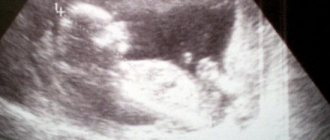When a woman’s ultimate dream is successful conception, she waits for the desired pregnancy every cycle. The girl tries to see and feel the onset of conception, looks for early symptoms of the birth of a new life, suspicious signs indicating imminent motherhood, etc. Naturally, before the delay, the girl begins to check for the presence of conception using home express systems, hoping to see the two cherished lines. Will the test show pregnancy before the delay or is conducting research so early a waste of time and money?
An exciting period in the life of any family is the anticipation of the arrival of the baby.
Express system design
After implantation of the embryo, the chorionic membrane begins to intensively produce gonadotropic hormone. Test systems are equipped with a special indicator impregnated with a chemical substance that reacts to the presence of this similar hormonal substance in the urine. Due to the presence of gonadotropin chorionic hormone, testing produces two lines.
- If conception has not occurred, hCG levels will remain low, so test systems will not be able to detect the hormone, which will appear as a single line on the test strip. This strip is a control line; the line appears when the device is working properly and is working correctly.
- If not a single line or only one test line appears on the indicator during testing, then such an express system is considered faulty, and therefore the results cannot be regarded as reliable.
- If the rapid test is of high quality and all the rules for its use are followed, then the reliability of such a study reaches more than 98%.
- Also, the reliability of test systems is affected by the timing of testing, because the content of hCG in the body increases gradually and reaches a concentration that the test can recognize only after a certain time.
All these factors must be taken into account when testing.
Test effectiveness
It is also important when you can take a pregnancy test. Gonadotropic hormone produced by the chorion begins to be produced in the blood a day after implantation. Every two days its amount approximately doubles. Can a pregnancy test be positive if there is no conception? In general this is impossible, although theoretically there are exceptions. In the body of any person there is a small amount of this hormone, only in alpha form. After implantation, the chorion produces another type of hCG - the beta form. That is why the two test strips appear only in the presence of pregnancy, because they react to beta-hCG.
The effectiveness of express systems depends on such an indicator as sensitivity. There are devices that are capable of detecting conception a very short period of time after implantation. Conventional strip strips, for example, can recognize pregnancy when hCG levels in the blood reach a concentration of 20-25 mIU/ml.
But there are also ultra-sensitive tests that can detect a hormonal substance in an amount of 10 mIU/ml; this is the typical content 7-10 days after conception has occurred. In other words, the concentration of the hormone, determined by ultra-sensitive tests, is achieved approximately 5 days before the arrival of the next menstruation, i.e., such a pregnancy test will already be able to determine an interesting position before a missed period.
Features of pregnancy testing using tests
When confirming the fact of an “interesting situation,” the girls always focused on the following characteristic signs:
- delay of menstruation;
- nagging pain in the lower abdomen and lower back;
- enlargement and tenderness of the mammary glands;
- frequent urge to urinate;
- nausea, sometimes vomiting;
- mood swings.
Gynecologists establish pregnancy during examination, focusing on the cyanosis of the vaginal walls, enlarged uterus, closed cervix, and other signs. You can also do a blood test to check the presence and levels of the hCG hormone.
The main signs of pregnancy, in the presence of which gynecologists recommend purchasing a pregnancy test
Supersensitive or conventional tests
But today girls can independently use methods for early detection of conception. There are a sufficient number of tests that determine pregnancy when a short period of time has passed from the moment of fertilization. To understand what is the most sensitive pregnancy test before a missed period, you need to find out which hCG parameter they are able to recognize.
Regular strips show their effect when the pregnancy hormone content is 20-25 mIU/ml. Hypersensitive are those who are able to detect the level of human chorionic gonadotropin as low as 10 mIU/ml, which is typical for 7-10 days after conception.
The outer membrane of the fertilized egg (chorion), immediately after its implantation into the wall of the uterus, begins to produce the pregnancy hormone, its value increases exponentially, doubling every 1-2 days. Approximately 5 days before the start of the next menstruation, the number readable by test reagents is reached.
Rating of brands based on reviews
Based on reviews, it can be argued that the most sensitive pregnancy test before a delay is Clearblue Digital. This is a digital mini device with a period indicator in weeks. Used 5 days before the next menstruation.
Clearblue Digital - a digital test that shows the gestational age on a display
But statistics show that testing carried out 1 day before the start of critical days gives the correct result in 98% of cases, and 4 days - 65%. The analysis procedure is as follows:
- The absorbent end of the strip must be held under stream of urine for 5 seconds (the second option is to lower it into the container for 20 seconds).
- Put on the cap and set aside for 3 minutes.
- The entry “pregnant” and the term 1-2, 2-3, 3+ (meaning weeks) or “not pregnant” will appear on the screen. The answer will remain on the display for 24 hours.
On the test screen, if you are pregnant, you can find out the duration in weeks
. Clearblue Plus is also able to show a positive result in the same period. It is simpler and more economical.
Some girls believe that the most sensitive pregnancy test before a delay is produced by the company Pharmaco. Here in first place is Sezam - an ultra-sensitive test cassette in a plastic case. It has two windows: for entering the test sample and reading the answer.
Sezam is an ultra-sensitive test cassette for determining pregnancy 7 days after conception
The fact of conception can be confirmed within 7 days from the moment of fertilization (5-7 days before the delay with hCG - 10 mIU/ml). The kit includes a pipette that measures 3 drops of urine and a container for collecting it. The result is displayed after 3 minutes. This brand's Ultra test strip is also in demand and has a similar reaction.
Ultra – ultra-sensitive test strips for quick pregnancy detection
Benefits of tests
A special calendar will help determine suitable days for conception
The use of home express systems has many advantages over other methods of determining pregnancy. Firstly, the pregnancy test is quite easy to use; it does not require any special skills, medical education or laboratory equipment. You just need to follow the instructions. Secondly, the use of such devices guarantees the patient absolute anonymity. You can do a study and get the result, but no one will be able to find out anything unless the patient herself wants it.
Moreover, a pregnancy test will show conception at a fairly early stage of gestation, when there are no obvious signs of an interesting position. The reliability of the pregnancy test reaches 95-100%, which is also considered a definite plus. Another advantage of express systems is a fairly large range of these devices with a wide range of prices. Therefore, any girl can choose an inexpensive and, most importantly, high-quality and most accurate test for herself.
How the pregnancy test works
Devices for diagnosing pregnancy have become so widespread and popular that manufacturers are constantly improving them, making them more convenient, practical and sensitive. The last criterion, according to them, is the most important, since it is thanks to it that conception can be detected at the earliest stages.
Thanks to a variety of forms, a woman can take a pregnancy test wherever she wants, and whenever she pleases. However, regardless of the price and type of devices, all tests that determine pregnancy work according to the same method: they isolate human chorionic gonadotropin among other hormones in a woman’s urine. It would be more correct to say its quantity. After all, this hormone is always present in the body of men and women, but in extremely low concentrations.
At the moment when the process of implantation of the future embryo into the wall of the uterus occurs, a rapid increase in hCG begins. Every day after conception, the amount of the hormone doubles. Its production is carried out by the membrane covering the fertilized egg, which in a few weeks will become the fetal placenta.
The first day after conception, the “sign” hormone can only be detected in the blood. In other biological fluids its amount is minimal. However, the closer the time of the menstrual cycle approaches, the more hormone will accumulate in the urine. When its amount reaches 10 IU, particularly sensitive specimens will be able to “calculate” pregnancy. The table below shows the amount of hCG in the blood. The level of hCG in the urine is slightly behind.
Flaws
But despite the many advantages of express systems, each test can also have many disadvantages.
- For example, if the system for determining pregnancy has confirmed the fact of conception, this does not mean that gestation is occurring as planned, and the fertilized egg is located inside the uterine body. Unfortunately, such a device cannot show whether a intrauterine pregnancy is developing or ectopic.
- In addition, it can never be ruled out that testing does not show a completely reliable result.
- It may also be that it will not be possible to determine pregnancy due to the poor quality of the express system or the expiration date of the device.
- Some types of such devices are quite expensive and therefore are inaccessible to most patients.
As you can see, there are no ideal ways to determine pregnancy before a delay; each method, even such a simple and convenient one as an express test, is not without its drawbacks.
Kinds
There are different types of tests for home use. Strip stripes are the most popular among girls. They are first generation devices and are considered the most affordable in terms of cost. Such strips should be lowered into a portion of morning urine until the line marked on it for 10-20 seconds. Then the strip strip is placed on a dry and flat surface, and after a couple of minutes you can find out whether the girl is pregnant or not. Using the test is quite simple and convenient, and the results in most cases are reliable. Although such a device also has some disadvantages, for example, for testing you need to collect urine in a separate container, and you only need to use morning urine, otherwise there is a high probability of error.
It is best to check in the morning
More convenient means for this purpose are test cassettes, which are actually the same strip tests, only they are placed in plastic tablets. There are two windows on the tablet’s body; urine needs to be dropped into one, and a certain result is read in the other.
But the most modern stress systems are jet ones. When the test is placed under a stream of urine, the result can be assessed after a few minutes. This test will show pregnancy before the delay, because it is considered one of the best and most sensitive. Moreover, express jet systems do not require additional steps, such as collecting urine in a separate container, and therefore are considered the most convenient.
Rules
In order for pregnancy tests before and after a delay to show reliable results, it is necessary to strictly follow the manufacturer's recommendations for use. Firstly, any test, regardless of whether it is done a week before menstruation or after menstruation is delayed, must be used only in the morning. It’s just that in the very first urine, which has not yet been diluted with drinks consumed during the day, the concentration of human chorionic gonadotropin is as high as possible. Therefore, testing with such urine will show as accurately as possible whether the girl is pregnant or not.
It is necessary to do a pregnancy test before the delay, using at least 20-30 ml of urine, only it must be fresh, just collected; urine should absolutely not be cooled or frozen, shaken or shaken. If a girl’s circumstances are such that testing needs to be done in the evening, then she needs to limit her fluid intake so as not to accidentally dilute her urine, then the analysis will show an accurate result before the delay. If testing is carried out using a strip strip, then a clean container must be used to collect urine. The strip should be dipped into the urine for about 20 seconds, and after 3-4 minutes you can evaluate the results.
On what day from conception can the test react to hCG?
Can a home test give a positive result if taken before my period is missed? At what point in the cycle does it make sense to conduct such testing? In order to answer this question, let’s consider the processes occurring in the female body over time.
The fusion of the egg with the sperm occurs in the fallopian tube. Within 3–5 days, the fertilized egg moves through the tube and enters the uterus. Here it is implanted into the lining of the uterine wall.
Human chorionic gonadotropin appears in the body 24–48 hours after implantation, but in the first days its concentration is negligible and cannot be recognized during testing. However, hormone production increases quite quickly and has the following dynamics:
- 1 day after implantation – 4 mIU/ml,
- Day 2 – 7 mIU/ml,
- Day 3 – 11 mIU/ml,
- Day 4 – 18 mIU/ml,
- Day 5 – 28 mIU/ml,
- Day 6 – 45 mIU/ml,
- Day 7 – 73 mIU/ml,
- Day 8 – 105 mIU/ml,
- Day 9 – 160 mIU/ml.
Here are the average hCG levels. Different women may experience deviations from the average in one direction or another, depending on the characteristics of the body as a whole and its endocrine system in particular. Therefore, a pregnancy test before a missed period may show different results.
Why in the morning
Almost all instructions for tests indicate that the use of a pregnancy test before a delay should be carried out in the morning. Why is this so important?
- The determining factor here lies in the renal activity and hormonal metabolism of the expectant mother.
- Gonadotropic hormone is partially excreted from the body in the urine. The concentration of this substance depends on the volume of urine excreted.
- The more it is released, the less hCG will be in the urine. Then home testing will not be able to show pregnancy before the delay.
- Therefore, experts recommend testing in the morning with the first urine. After all, at night mommy doesn’t drink anything and doesn’t go to the toilet, so the level of hCG in the urine increases.
- In the evening, a pregnant woman’s urine becomes diluted, and the concentration of chorionic hormone becomes minimal.
- Throughout the day, it is gradually eliminated from the body, and by the evening it reaches very insignificant values.
If you do a test before your period, which has a high sensitivity level, then it will show a reliable result either in the morning or in the evening. There are types of inkjet tests that have an increased sensitivity of 10-15 mIU/ml; they can be used at any time, even before the expected onset of menstruation.
How to get reliable results
Modern tests are based on determining the presence of hCG in the urine. As a result of a properly conducted study at home, you can get an answer to the main question: whether conception occurred or not. In this case, the amount of hormone can even be used to determine the duration of pregnancy.
Human chorionic gonadotropin begins to be intensively released after the embryo attaches to the uterine cavity. The concentration of this hormone in the blood serum increases within a week after fertilization of the egg. This makes it possible to diagnose conception in the early stages in the laboratory. As for urine, hCG is excreted unchanged by the kidneys. Thus, using a pregnancy test before a missed period is quite effective.
To get an accurate result, experts recommend purchasing ultra-sensitive tests. They are able to detect the presence of the hormone at a concentration of 10 mM/ml. With their help, it will be possible to establish conception even 10 days after ovulation. Thus, there is no need to wait for delays.
Going to the doctor at this time will not give the desired results. The fact is that the uterus is not yet changing in size, and an ultrasound will not show whether fertilization has occurred or not. The only thing that can indicate an interesting situation is general weakness, a change in taste, and nausea.
In order for the test to show reliable results, it is necessary to follow the following principles:
- It is not recommended to take the most sensitive pregnancy test until one day after possible fertilization. The hormone begins to be released intensively a week after conception.
- It is best to use the test 14 days after possible fertilization of the egg. Often during this period a delay of several days begins.
- It is recommended to use morning urine for analysis. This is due to the fact that it is more concentrated. As a result, the amount of human chorionic gonadotropin will be maximum. If the delay in menstruation lasts 6 days or more, then the test can be performed throughout the day. In this case, the hormone level will be higher in any case. The result must be read within the first 5 minutes. After this period, the test may not be accurate.
- Before using the test, you must carefully study the instructions. Particular attention should be paid to what level of human chorionic gonadotropin it determines.
It is important to consider the fact that tests only indicate the presence of pregnancy, and not its location. If the result is positive and there is no fertilized egg, you should immediately contact a gynecologist. This will rule out an ectopic pregnancy. Timely diagnosis of this pathology will allow the necessary surgery to be performed and the fallopian tube to be preserved.
In some cases, the earliest pregnancy test before a delay shows an incorrect result. This is possible for various reasons. If the result was positive, but conception was not actually established by doctors, then this is possible against the background of the following factors:
- use of poor quality test;
- incorrect analysis;
- use of hCG drugs;
- hydatidiform mole;
- Hormone levels have not yet recovered from a recently miscarried pregnancy.
The test also sometimes shows a false negative result. The reason for this may be a poor-quality jet pregnancy test before the delay or improper implementation of the procedure. To get an accurate result, it is necessary to examine the morning urethra.
Why after the delay
Good news about the long-awaited addition to the family
Test manufacturers assure that their express systems can detect conception from the first day of a missed period. It’s just that chorionic hormone is produced in the mother’s body gradually, starting from the first day of implantation. A similar process, as is known, occurs approximately 7-10 days after fertilization. Moreover, at first the levels of this hormonal substance are negligible, so long before the onset of menstruation, tests will not be able to detect hCG in urine.
But every 48 hours, the hCG level doubles, so after a week it reaches a concentration that is already detected by the test system, which means that detecting pregnancy will not cause difficulties. But many girls do not want to wait until the delay and rush to do the research earlier. But can the test show pregnancy before menstruation or not?
What day to take a pregnancy test
It would seem that everything is extremely clear, and sensitive tests will determine the presence of pregnancy already on the seventh day after fertilization. However, in practice everything is not so simple. The fact is that the time it takes for the concentration of hCG in the urine to reach the desired level will be different for all women. It depends on the following factors:
- Duration of the menstrual cycle;
- The day of ovulation;
- The day on which fertilization occurred;
- Physiological characteristics of a woman.
Moreover, you need to know that a positive result of a highly sensitive test may be the result of a biochemical pregnancy. In this case, the positive result of the diagnostic device does not deceive the woman: conception really occurred. However, for some reason, the pregnancy stopped developing, which was reflected in the onset of menstruation.
Express tests will most likely determine the true state of affairs 2 weeks after conception has taken place. And gynecologists agree that home diagnostics should not be carried out earlier than 2-3 days after the expected menstruation is missed. Then the possibility of an erroneous test result is minimal, since the hCG level will already reach the desired level in any woman.
However, numerous reviews from women who found out about their pregnancy before the delay began “urge” women dreaming of a child to purchase expensive tests that promise to show conception as early as possible. How true are these statements? Can a test show pregnancy before a delay and when should diagnosis begin? Let's look at the reasons for hormonal changes in the expectant mother after conception, as well as how the test recognizes them.
Test before delay
So, the girl is really looking forward to conception, and almost immediately after ovulation she begins to do tests every day. But when to carry out pregnancy tests before the delay, so that they give the most reliable results. Experts say that even the most super sensitive test systems do not show accurate results if testing is carried out before the delay.
Here we need to look into it in more detail. A woman with a regular menstrual cycle usually never experiences delays, and her ovulatory period occurs in the middle of the cycle. If menstruation begins on the 30th day of each cycle, then ovulation occurs on the 15th day, if the cycle is 28 days, then on the 14th day, etc. Fertilization can occur on the ovulatory day or within 2 days after that. The sperm fuses with the female cell, then it travels through the fallopian tube for another 7-10 days to the implantation site. At about 22-25 days of the cycle, you can take a blood test and it will be able to detect hCG and confirm the fact of conception.
But will the test show pregnancy before your period? Girls who cannot wait the right time are often tormented by a similar question. The most accurate and ultra-sensitive test systems are able to detect conception approximately 4 days before the next menstruation. If you did not know whether it is possible to determine pregnancy before a delay, then experts confirm that this is possible.
If everything is clear with a normal pregnancy, then with an ectopic pregnancy there are many ambiguities. Does the test show an ectopic pregnancy before the period is overdue? During ectopic gestation, the cell is implanted outside the uterus, so hCG is produced in small quantities. Therefore, if the ovum is ectopic, testing before the delay shows the absence of pregnancy.
Types of tests that determine pregnancy before delay
Currently, there are a large number of different tests to determine pregnancy. The most common is the “Strip test” - strips dipped into a container with urine.
The sensitivity of such tests is on average low. Approximately 25 mMeml. Stream tests show the result while, as the name suggests, being under a stream of urine. Their sensitivity is already much higher – from 10 mMeml.
Plate tests contain a small container that is filled with a few drops of urine. Their sensitivity is slightly higher than strip tests.
There are also electronic, reusable tests to determine whether conception has taken place.
In addition to tests that use urine to determine the results of the hCG hormone, there are also tests that use blood. To do this, you need to take it to the clinic for an appropriate analysis.
Previously, it was not possible to find out about pregnancy in the early stages, but today's technologies make it possible. For example, rapid testing is available to everyone, which determines conception using a special test.
These tests are easy to use and sometimes even allow women to determine pregnancy several days before their next menstruation is missed. The newest rapid tests have great sensitivity, which helps to respond to a slight increase in the hormone.
Probability of error
Sometimes express systems produce not entirely reliable results. Why does this happen?
- If you do the test before the delay, the reliability drops to 85-90%.
- If the test is carried out too early, chorionic gonadotropin will not have time to reach the required concentration, and the test will produce a negative result.
- A similar picture is observed if the patient drank a lot of fluid before testing, the urine becomes diluted, and the hormonal level drops.
- An expired rapid test may give a false positive result when there is no pregnancy.
Home diagnostics using pharmacy test devices can produce erroneous results if the tests were stored incorrectly or the girl uses an expired product.
Decoding the result
Interpretation of results is important in rapid testing. A result should be considered positive if menstruation is delayed, and two clear and bright stripes are visible on the device. If testing is carried out in the early period (the day before the delay or on its first day), then the second strip may be somewhat dull and weakly expressed.
The absence of pregnancy is confirmed only if one clear feature is visible, which often happens when the patient starts testing too early. With this result, it is recommended to re-diagnosis after 3-4 days. There are interesting situations when the express system does not show a single lane at all. In this case, the result is considered unreliable.
Sometimes girls begin to look for options on how to determine pregnancy without a test in order to find out about their condition long before the delay. In fact, pregnancy is considered to have taken place only after implantation, which occurs about a week before the delay. Whatever the test, it will not be able to detect conception at this stage. But a blood test for hCG may well determine an interesting situation in the first couple of days after implantation.











